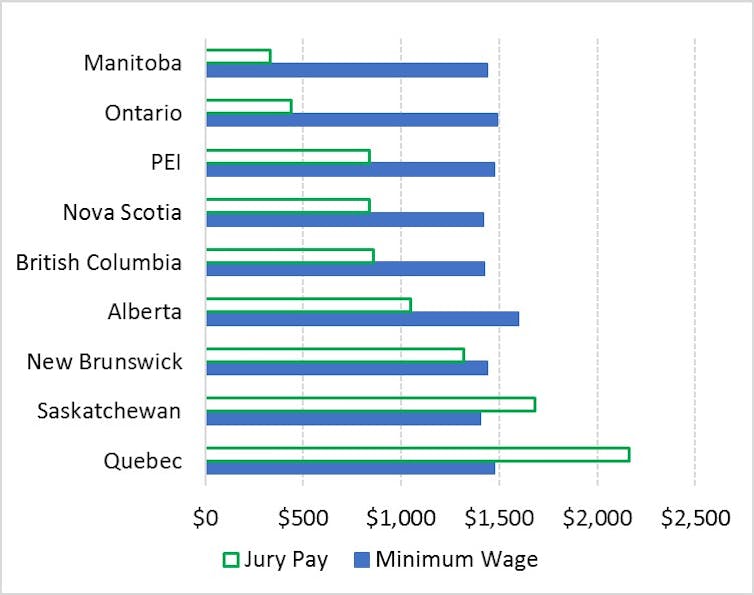A House of Commons committee recommended this week that provinces increase their jury pay rates to at least $120 per day. The committee report further suggests provinces cover jurors’ expenses, including transportation and meals. That works out to $15 per hour plus expenses, assuming eight-hour days.
Not coincidentally, that’s what Alberta’s minimum wage will become on Oct. 1. The provincial labour minister, Christina May, justified the increase by stating “this is exactly the time for a fair wage.”
A similar increase is under way in Ontario. Liberal Kathleen Wynne, now running for re-election, has said “we need to make certain that our workers are treated fairly.”
So if these provincial governments are serious about fairness, they should implement the federal recommendations. They need to start paying jurors at least the minimum wage for trial participation.
Suppose you are one of the thousands of Canadians summoned to courthouses each year for possible jury selection. In most provinces, your employer is obliged to release you, but isn’t obliged to pay you while you’re missing work.
You first spend several hours at the courthouse waiting to see if you get picked. If so, you attend your assigned trial for however long it lasts, but you won’t be paid much in return for your hours of time.
Ontario’s miserly jury pay
If you’re a juror in Ontario, you get paid nothing during the selection process, nor during the first 10 days of duty. You then receive $40 per day for days 11 to 49, and $100 daily thereafter. So if the trial lasts a month (say, 21 court days of perhaps six hours each), you receive only $440 for your obliging and obligatory service.
Compare that to someone earning Ontario’s minimum wage of $14 per hour. They receive $84 for a six-hour day. That’s $1,764 per month, four times what jurors get.
Under the province’s planned increase to $15 in 2019, a minimum wage employee will begin earning $1,890 monthly.
Other factors make the pay gap between jurors and employees even worse.
First, jurors receive no vacation pay. That extra four per cent boosts a worker’s monthly total to $1,834 at current rates, or $1,966 after the proposed increase.
Second, while serving on juries, most people give up eight-hour days at their regular job, not six. They thus miss out on at least $2,446 or $2,661, respectively.
Third, most employees (thankfully) earn more than minimum wage. The Canadian average is $27.95 hourly, or about $4,696 per month. That’s 11 times Ontario’s jury pay.
Maybe jurors should apply for social assistance. Singles get up to $706 monthly; families receive more.
Most provinces under-compensate
Manitoba is even stingier. Jurors receive nothing for the first 10 days, and only $30 daily thereafter; that’s $330 for a month-long trial. By comparison, working six-hour days at the province’s $11.15 hourly minimum wage yields $1,461 per month, including vacation pay.
At the other extreme, Quebec leads the way on jury compensation. It offers $103 per day, with extra pay for long days or extended trials. A month-long trial pays $2,163. It also reimburses meals, transportation, child care and counselling.
Newfoundland takes a different approach. Instead of paying jurors, it requires employers to provide paid court leave. That’s good for employees, who get their full wages and benefits. But it dumps jury costs onto employers.

Such underpayment would be illegal for other employers. For example, Ontario has repeatedly cracked down on unpaid student internships. Yet their own juror “interns” go unpaid for two weeks and underpaid for eight. Why do our governments continue to exempt themselves?
‘Civic duty’
Some traditionalists argue that jury service is different because it’s a “civic duty.” Jurors do indeed provide (mostly) honourable service; but that’s a reason for more pay, not less. Soldiers and police also serve society. But even an army private gets $2,985 per month.
Some jurors have said their court experience was interesting and educational. But many find it stressful or even traumatic, especially for long trials of violent crimes.
There are several reasons, aside from basic fairness, that we should pay jurors better. Since I’m a business professor, I’m focusing here on financial issues.
First, it would encourage jury participation rather than absenteeism. Low-paid workers would no longer suffer financially as jurors. Higher-paid ones would at least feel less penalized. Some folks, like part-timers and the unemployed, might even find service attractive.
As the Commons committee notes, this could also help make juries more representative of the general population. A lack of juror diversity has led to controversy around high-profile trials like the Gerald Stanley verdict in the death of Colten Boushie.
Read more: A good first step towards diverse, impartial Canadian juries
Good for the economy
Second, we have the same economic arguments that support minimum wage increases. More than two million Canadians are unemployed or earning minimum wage. Putting more money in their threadbare pockets while they’re on juries would be good for their families and the economy.
Finally, paying jurors properly could provide political leverage for the minimum wage increases underway in Alberta and Ontario. Those steep hikes face stiff resistance from business groups. The Canadian Federation of Independent Business for example is “shocked and appalled.”
Provincial governments look like hypocrites when they force other employers to provide higher wages, while still underpaying their own jurors. They should instead put their money where their mouths are and start paying at least $120 plus expenses daily. Then they can claim to be “sharing the pain.”
When discussing the minimum wage, Wynne has said: “It’s time this rate reflected the reality of people’s lives.”
Let’s hope all the premiers soon say that about jury pay too.

